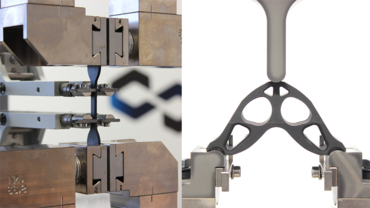Testing of 3D-Printed Components in the Plastics Industry
3D-printed plastics components, commonly used as prototypes, are increasingly being used in production. With this versatile process, new products are continuously being developed and existing components are optimized. To reduce testing and analysis expenses while establishing industry- recognized test standards for development and production for the 3D printing industry, Cubicure in Vienna, Austria relies on testing technology from ZwickRoell.
Despite the increasing use of 3D-printed high-performance polymers, there is a lack of generally accepted test standards. To speed up their establishment, Cubicure in Vienna has set up a testing lab with testing technology from ZwickRoell. Implemented in accordance with ISO 17296-3, ZwickRoell’s state-of-the-art instruments and testXpert III testing software deliver reliable test results. With the UTM Proline Z010 for tensile and flexure tests, the HIT5.5P Plus impact tester with instrumented pendulum, and the hardness testers for Shore-A and Shore-D, extensive testing options are at their disposal. The HDT/Vicat Standard, which measures the heat deflection temperature of high performance polymers (~300 °C), completes the fleet of machines. While equipping the lab, particular attention was given to carrying out standard-compliant tests with very little use of materials—and therefore small specimen geometries—during the development phase. Equally important was the option to customize test standards in order to be able to characterize new material categories for which test standards currently do not exist. It was decided to move forward with ZwickRoell in Ulm whose testing machines, thanks to innovative software, not only fulfill the listed requirements but are also operator friendly. Other benefits include reliable service and long operating life of the testing machines.
About Cubicure:
Cubicure GmbH was founded in March 2015 by Prof. Jürgen Stampfl (Institute of Materials Science and Technology) and Dr. Robert Gmeiner, as a spin-off of the Technical University in Vienna. The company specializes in additive manufacturing of high performance polymers. The specially developed hot lithography technology is based on light-curable plastics that are printed by curing the plastic with a laser in a layer-by-layer approach with highprecision. With this special 3D-printing alternative, materials whose (thermo) mechanical properties are similar to those of technical thermoplastics, can be processed with the highest degree of precision. The equipment installation of the testing lab took place in 2018 as part of the Shared Facilities Project, sponsored by the Vienna Business Agency – funded by the city of Vienna. Therefore, the testing equipment is also available to other local Austrian 3D printing companies upon request, and is intended to further the materials development for additive manufacturing processes.
